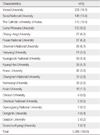Abstract
Purpose
This study aimed to identify contents and trends of Korean nursing doctoral dissertations in terms of research methodology and theoretical characteristics.
Methods
The design of the study was descriptive study and a total of 1,089 quantitative studies completed between 1982 and 2010 were reviewed using the analytical framework developed by the researchers.
Results
The majority of studies utilized the experimental design (51.5%) and the others were survey design (38.8%) and methodological design (5.0%). Study subjects were shown as patients (45%), care givers (11.2%), ordinary persons (40.6%) and others (3.2%). There were growing trends in experimental design and patients as subjects. The prevailing data collection settings were hospitals (45.8%) and community (27.8%). The theoretical frameworks that studies were based on were the existing theories (37%) and a newly developed theoretical framework by a researcher (25.2%). a framework derived from other studies by the researcher (25.2%). Majority of studies (78.5%) employed a single theory as a theoretical framework. However, 31.8% of studies had no theoretical framework based on.
References
1. Choe M.A., Hong K.J., Han K.J., Park Y.S., Park S.A., Han Y.S., et al. Trends of doctoral dissertations of one college of nursing in Korea. Journal of Korean Academic Society of Nursing Education. 2009. 15:32–43.
2. Kim E.S., Kim G.S., Kim D.R., Kim E.J., Sung K.M., Shin H.K., et al. Trends of nursing science inquiry in doctoral dissertations. Journal of Korean Academy of Nursing. 2004. 34:315–323.
3. Kim H.G., Lee Y.S. A statistical analysis on nursing-related theses in Korea. Korean Nurse. 1996. 34:68–81.
4. Kim M.J., Lee M.S., Lee M.H., Lee W.I. Analysis of experimental studies on master's and doctoral theses in nursing. Journal of Korean Academy of Nursing. 1994. 24:96–114.
5. Shin H.S., Hyun M.S., Ku M.O., Cho M.O., Kim S.Y., Jeong J.S., et al. Analysis of research papers published in the Journal of Korean Academy of Nursing-focused on research trends, intervention studies, and level of evidence in the research. Journal of Korean Academy of Nursing. 2010. 40:139–149. http://dx.doi.org/10.4040/jkan.2010.40.1.139.
6. Shin H.S., Sung K.M., Jeong S.H., Kim D.R. Trends of doctoral dissertations in nursing science: Focused on studies submitted since 2000. Journal of Korean Academy of Nursing. 2008. 38:74–82. http://dx.doi.org/10.4040/jkan.2008.38.1.74.
7. Spear H.J. Nursing theory and knowledge development: A descriptive review of doctoral dissertations, 2000-2004. Advances in Nursing Science. 2007. 30:E1–E14.
8. Suh Y.O., Park J.S., Yang J.H., Kim H.W., Suk M.S., Shin H.S., et al. Analysis of research papers published in the Journal of Korean Academy of Nursing. Journal of Korean Academy of Nursing. 2007. 37:1013–1019.




 PDF
PDF ePub
ePub Citation
Citation Print
Print







 XML Download
XML Download